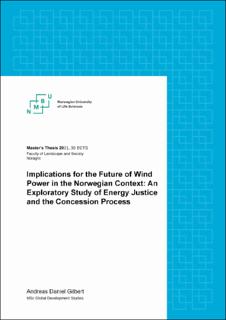| dc.description.abstract | How can we better understand the future of onshore wind power in the Norwegian context? Adaptation processes, such as the shift towards renewable energy resources, have accelerated in recent decades. Wind turbine technologies have become more efficient and cheaper, leading to a significant increase in applications for—and approvals of—concessions for onshore wind power projects in Norway. Increased concessions and building have despite their desired environmental outcomes led to protests, problems of social acceptance, how socio-technical futures are imagined, and emergent questions of energy justice. In order to understand the future of Norwegian onshore wind power, I draw on literature, six semi-structured interviews, and a report from the Norwegian Water Resources and Energy Directorate (NVE). In my analysis, I assess NVE ́s recommended measures for concession process improvement through an energy justice framework, and interview data through the lenses of energy justice and socio- technical imaginaries. I find that the recommended measures correspond with tenets of energy justice, and that respondents view communication, framing, and predictability as integral improvements needed for future concessions to be considered. These results address micro and meso level injustices experienced by stakeholders. Macro level injustices are underrepresented, and the broader implications of renewable energy development have not yet been widely discussed. Socio-technical imaginations may aid in re-framing the direction onshore wind power will take within the Norwegian context in years to come. The thesis informs scholarship on topics related to energy justice, socio-technical imaginaries, social acceptance, concession processes, and adaptation/transition thinking—and their significance to wind power and communities impacted by its development. | en_US |

